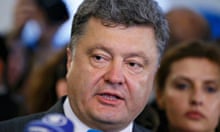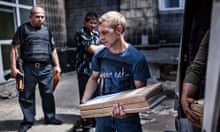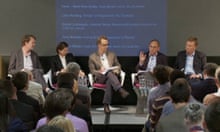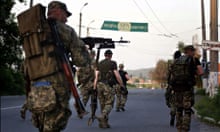The "People's Republic of Donetsk" declared itself an independent country on Monday and, within two hours of doing so, had asked to join Russia. The separatist leader Denis Pushilin told journalists that the self-proclaimed republic would ask Moscow to consider absorbing the region, which borders Russia.
But it remains extremely doubtful whether Moscow will carry out a Crimea-style annexation of the region, which held a controversial referendum on independence on Sunday, together with neighbouring Luhansk.
According to results announced by the de facto authorities in Donetsk and Luhansk – which also declared independence from Ukraine on Monday – about 90% on a turnout of 70% and 96% on a turnout of nearly 75% respectively voted for state sovereignty. The referendums – which Kiev has dismissed as illegitimate – were hastily organised and marked by numerous violations.
The results were roundly condemned in the west, but Russia said it respected the results. However, instead of previous statements saying it would protect people in the regions with troops if need be, the Kremlin called for dialogue between the government in Kiev and the south-east regions of the country.
"In Moscow, we respect the will of the people of the Donetsk and Luhansk regions and are counting on practical implementation of the outcome of the referendum in a civilised manner, without any repeat of violence and through dialogue," the Kremlin said.
In a press conference in Moscow, Sergei Lavrov, Russia's foreign minister, read out the Kremlin statement and added that only Russian television channels were telling "the truth in real time" about the crisis, whereas western news outlets were hiding the real causes.
Lavrov made no mention of the controversy over the referendum, merely noting the "high voting activity" of the population despite attempts from Kiev to disrupt the vote. He said no new international talks were planned on Ukraine.
Oleksandr Turchynov, Ukraine's acting president, told the country's parliament: "The farce which terrorists call the referendum will have no legal consequences except the criminal responsibility for its organisers."
The Kremlin has called the new government in Kiev "neo-fascist" and Kiev has accused Russia of organising the separatist movement by providing weapons and tactical advice. Nevertheless, Vladimir Putin, the Russian president, last week asked the separatists to delay their referendum, which appeared to be an attempt to distance Russia from the vote, but was ignored.
There were a number of irregularities with the count and procedure, and it seems unlikely that the figures announced are an accurate reflection of views in the region, with most of those who disagreed with the proposition staying at home.
Nevertheless, there has been an increasing mood of defiance, especially as a Ukrainian army operation against the armed separatists resulted in multiple casualties. It is hard to judge how many people support the armed takeover of government buildings and attempts to separate from Ukraine, but feelings are running high.
The referendum question was worded ambiguously, appearing to offer state sovereignty for the Donetsk and Luhansk "people's republics". Roman Lyagin, head of the de facto central election committee in Donetsk, said before the vote that nothing would change in terms of state borders as a result of the vote.
He said that, in future, the region would be free to decide whether to stay within Ukraine, become independent or join Russia. In the end, it apparently took only two hours to make the decision, apparently making a mockery of what voters had been told in the runup.
In Luhansk, separatists announced that more than 96% of ballots had been cast in favour of the independence of the region from Ukraine.
"Congratulations on the birth of the Luhansk republic," said Vasily Nikitin, deputy head of the region's separatist movement. "We are now preparing an appeal to the UN and international community asking them to recognise us."
Nikitin said the constitution of the new "country" was almost ready, and added that its residents would not participate in Ukrainian presidential elections planned for 25 May. Donetsk's de facto authorities have also said they will not allow voting in the elections. A key demand of Moscow has been to postpone the elections.
In Luhansk, one resident, Anatoliy Sukharev, 80, approached Nikitin and asked whether there would be a second referendum on joining Russia.
"What is next? When are we going to have this referendum?" he asked. Nikitin said a second referendum would happen, but the republic needed to "organise as a country" first.
But for many Ukraine-oriented residents, recent events have been a tragedy.
"My father is a businessman, now he is trying to sell all his businesses here before moving away. Many people I know have already left," said Olesia, 20, who refused to give her last name fearing retribution.
"I can love Luhansk only if it is a Ukrainian Luhansk," she said.
The eastern regions are entering an uncertain situation, with tension and anger rising on both sides. Ukrainian army and affiliated paramilitary units killed unarmed civilians in Mariupol last week and in Krasnoarmeysk during the voting on Sunday. For their part, the rebels in Donetsk have taken hostages among pro-Ukraine activists and been accused of torture.
It is unclear whether either side is ready for talks. With a number of armed gangs in the region, there is every danger of conflict with Kiev forces and of events slipping into violent chaos.
A Kremlin-linked MP, Vyacheslav Nikonov, said the Ukrainian military operation in eastern Ukraine represented "genuine fascism" and said that the residents of Luhansk and Donetsk deserved no less support. "Indeed, they deserve much more support from us, than the residents of Crimea," he said.
However, he added that Moscow would have to weigh the "economic, political, and military risks" before deciding whether it should absorb the regions.
Gazprom, Russia's state energy company, also told Ukraine it had to settle a $3.5bn (£2bn) gas debt, and pay in advance for deliveries in June, or be cut off.
In Brussels, EU foreign ministers added 13 people and two firms to their visa ban and asset freeze list over Ukraine, according to two officials who spoke on condition of anonymity because the measure had yet to be officially announced. The EU has targeted a number of officials but the sanctions have been far narrower than US sanctions over Ukraine.








Comments (…)
Sign in or create your Guardian account to join the discussion